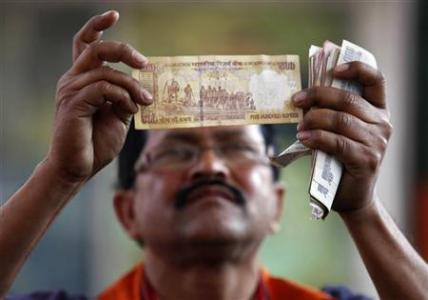Industry overwhelmingly welcomed the government’s move to ban Rs 500 and Rs 1,000 rupee notes. Stalwarts of the industry are optimistic that this move by the Modi government will curb unaccounted-for cash in the economy.
Here are some of the reactions:
SBI Chairman Arundhati Bhattacharya:”We have just now been advised of the Govt move to demonetise current series of Rs 1000 and Rs 500. We have handled demonetisation earlier and will do so again. Tomorrow Banks will remain closed in order to withdraw these notes from counters and ATMs. We will strive to restock ATMs at the earliest and make them operational. Govt has given enough exemptions to ensure urgent needs are met. We will work round the clock to ensure that customers have a smooth experience”
Naveen Surya – Chairman, Payment Council of India and Managing Director, ItzCash “We welcome this extremely bold and much needed step by Prime Minister Modi and the government to cure us from disease of cash in our society. I along with Payment Council and India and ItzCash greatly admire this move and provide our full support.”
Anuj Puri, Chairman & Country Head, JLL India:“The banning of higher currency notes is a major move which will help curb unaccounted-for cash in the real estate sector. We have just witnessed a tremendous step towards increased transparency in the Indian real estate industry. The effects will be far-reaching and immediate, and shake up the sector in no uncertain way. Stricter measures against black money have for long been required to help bring about greater transparency, give the Indian real estate sector more credibility and make it more attractive for foreign investors. Black money deals are more common on the unorganized market, but this practice has, in fact, been on the decrease with greater awareness on the part of buyers. Before too long, the caricatured version of black money driving Indian real estate is no longer applicable.”
Dr Naushad Forbes, President, CII:”Demonetizing high denomination notes can be an effective means of checking accumulation of wealth in cash. The government has taken a measure aimed at the heart of the black cash economy. CII congratulates the Prime Minister and the government for this step. Not only is the measure important but it requires extensive preparation for effective execution.”
Amit Sachdev, Co-Founder and CEO, CoinTribe: “In the long-term, though, this is likely to drive several benefits for the economy. India has made the first move from cash economy to a digital economy. Larger amount of savings and cash will find a way into the mainstream economy and be deployed for physical and financial asset creation. Use of digital currency and payment systems driven by UPI, wallets and cards will create enormous transparency and paves way for faster evolution of Fintech companies in India especially in transactions and Online lending space. Modi has made the right investment for the next generation. This move should improve India’s position on transparency and corruption in the global league table enabling higher capital flow (FDI/FII) into India. It would be good step for government to think of another VDS scheme with 70-80% penalty rate to bridge fiscal deficits,”
Archit Gupta, Founder & CEO, Cleartax:”This is a historic moment in India. No more black money.More people will be paying taxes, filing taxes and joining the mainstream economy.There will be deep pain to Indian citizens & economy in the short term. We are a country with large ambition and we will succeed. ClearTax will help citizens and businesses day and night to deal with the impact.
Getamber Anand, President – CREDAI National: “Effectively the primary market will not be very disturbed as the inventory was sold to end users who avail home loans. Moreover the organised part of the RE industry has always been compliant and it is only the unorganised fly by night players who will be affected. This move will help industry to fight more effectively for removal of section 43CA of the IT act as now there is no reason to charge tax on so called deemed income to both the buyer and seller post this move.”
Anis Chakravarty, Lead Economist, Deloitte India: “As generally expected, there is likely to be a disruption in the liquidity situation as households will get affected by the note exchange terms as laid by the government. Commodity transactions and the general cash market transactions are likely to feel an immediate impact. Besides the general elevation of uncertainty, the equity markets are likely to react negatively this morning though this will ease out in the medium term. On the macroeconomic front, we could see some appreciation of the domestic currency as the notes in circulation will decrease. This is likely to have a negative impact on trade. Counter moves by the government is expected to ease this though growth in the current quarter will likely fall.
On a sectoral basis, the commodities and agricultural sector including the market for consumer non-durables is expected to feel the heat. However, the largest impact in the medium to long term is likely to be the real estate sector which possibly will have the largest negative impact. on a positive note, there will be a reset of expectations as this represents in the long term a big push to the cashless economy and businesses in the fin tech sector are expected to see gains. Lastly, this move also shows the intent of the government to come up with game changing ideas and will represent a threat to all future operations in the black economy and hoarding of cash.”
Sathvik Vishwanath, CEO and Co-Founder, Unocoin: “The intentions are good but very difficult to achieve. If going cashless is the only way forward, certainly the bitcoin which is borderless trustless and transparent currency makes more sense”.
Manavjeet Singh, CEO & Founder, Rubique: “This is a promising move made by the government towards cashless economy. This will boost innovation in the nascent electronic payment industry. Without doubt, this will bring down frauds and thefts and costs of printing cash. A great blow to black money. If executed well, the costs of doing transactions between buyers and sellers will lower significantly by 2019.”
Satyam Kumar, Co-Founder, Loantap:”Biggest gamble by Mr . Modi , banning Rs 500 n Rs 1000 notes. What happens to Bharat with 46% unbanked population? Is #rbi geared for this, will it derail manufacturing recovery which is in early stage? Is #indianbanking prepared? Will #namo bite the dust this time?”
Ranjit Punja, CEO & Co-Founder, Creditmantri:”Sweeping step taken by the PM, but this should have a positive impact in curtailing black money and reducing corruption. Likely to cause some temporary hardship, and with the introduction of the Rs. 2,000 note, along with the security and tracking features, currency will be used as intended.”



